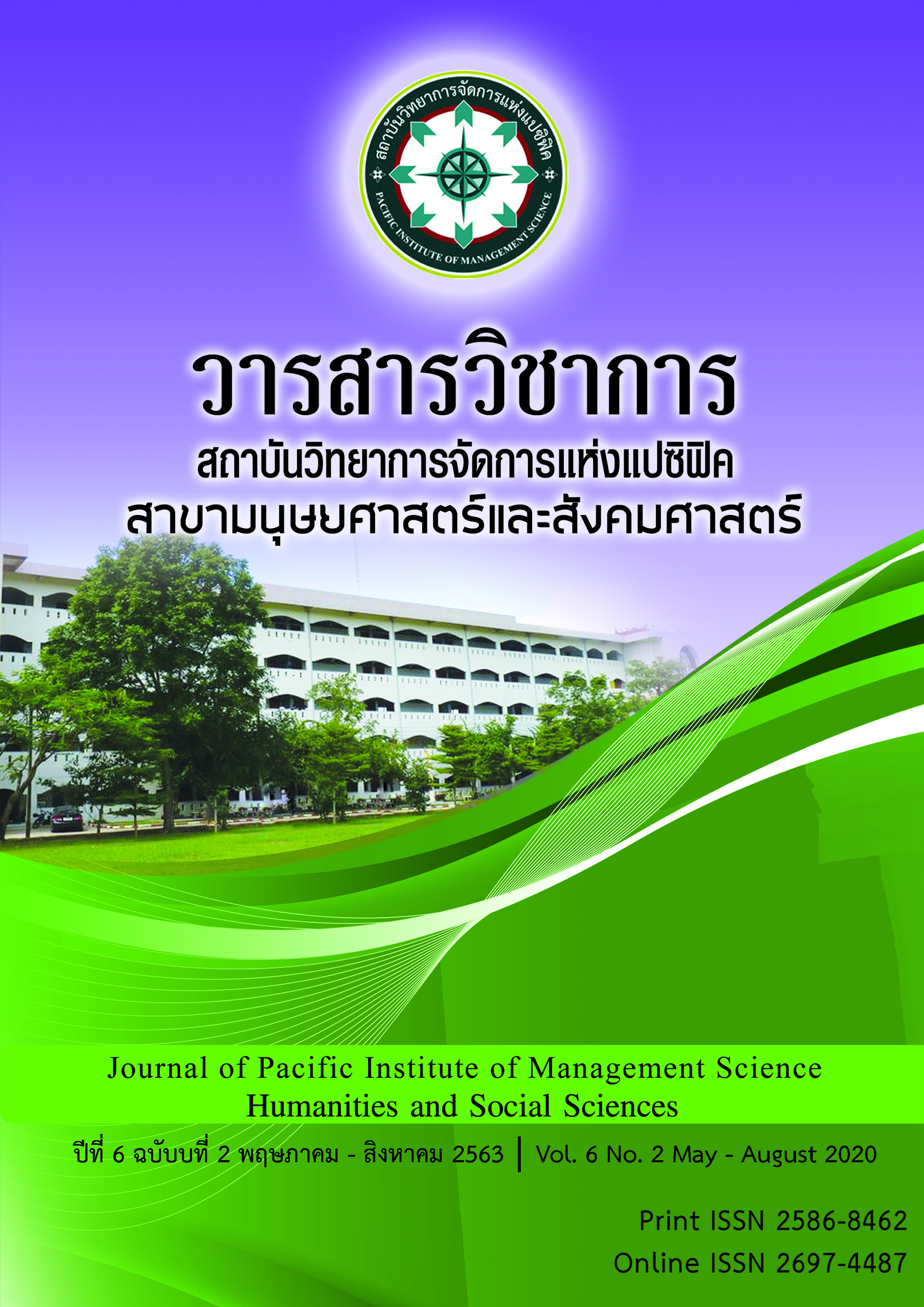The Study of the Efficiency of the Transportation Process: A Case Study of the Thailand Post Company Limited
Keywords:
Thailand Post, effective transport, principle of Lean, SWOTAbstract
The research aims to study the transport delay problem in order to analyze situation and search for enhancing the efficiency of transport particularly Thailand Post Company Limited. This study applies principle of Lean by reducing waste, and apply SWOT analysis. The research methodology applies qualitative method in which company’s officers are responsible for interviewing and observing the sample of study.
The study found that
1) the transport delay problem came from Deposit department and the distribution department in the company. These include employee perspective, work process, vehicles for delivering, environment, causing the transport delay problem.
2) SWOT analysis revealed the potential of domestic transport to customers as a strength, whereas the weakness is the quality of some services are not suitable to customer’s need. The opportunity, however, commercial customers always need company’s service as economic growth. The threat is the characteristics of customer’s desire have been rapidly changed according to new trend.
3) the lean analysis found that the flow of 3 departments, Deposit department Forwarding department And the distribution department in the company can utilize Tact Time machine for managing the balance of continuous flow with speed as well as reducing waste in moving postal and packaging. This also improves the flow of resource and information and reduces duplicating work process, which creates problem of related department distance. These generate customer satisfaction, faster and more effective work performance.
References
ฉมามาศ ประยงค์. (2555). การปรับปรุงเพิ่มประสิทธิภาพการขนส่งละกระจายสินค้า กรณีศึกษา บริษัทซี-โปร โลจีสติกส์ แอนด์ ดิสทริบิวชั่น จํากัด. วิทยานิพนธ์ มหาวิทยาลัยหอการค้าไทย.
ชินภัทร อ่อนฉิม. (2555). การเพิ่มประสิทธิภาพการขนส่งสินค้าภายในเขตกรุงเทพ และปริมณฑล กรณีศึกษาบริษัท เซ็นทรัล มาร์เก็ตติ้ง กรุ๊ป. วิทยานิพนธ์ มหาวิทยาลัยหอการค้าไทย
ทนงศักดิ์ สุทธิรักษ์. (2559). ประสิทธิภาพการจัดการขนส่งน้ำมันดิบทางรถไฟ. วิทยานิพนธ์ มหาวิทยาลัยบูรพา.
บานเย็น มณียศ และชัยฤทธิ์ ทองรอด. (2560). การจัดการลีน โลจิสติกส์ในงานผู้ป่วยนอกโรงพยาบาลยันฮี (Lean Logistics
Management for out-patient ward of Yanhee Hospital). วิทยานิพนธ์ มหาวิทยาลัยราชภัฎสวนสุนันทา.
ภุชชงค์ ภู่ย้อย. (2557). ประสิทธิภาพการให้บริการขนส่งพัสดุด่วนทางอากาศ กรณีศึกษา บริษัท เฟดเดอรัล เอ็กซ์เพรส ประเทศไทย จํากัด ภายในเขตปลอดอากร. วิทยานิพนธ์บริหารธุรกิจมหาบัณฑิต,วิทยาลัย เซาธ์อีสท์บางกอก.
ลลิดา ยิ่งสูง. (2551). ผลการประยุกต์ใช้ระบบผลิตแบบลีนร่วมกับการบริหารโซ่อุปทาน กรณีศึกษากลุ่มตัวออย่างของ อุตสาหกรรมการผลิต. วิทยานิพนธ์ มหาวิทยาลัยธรรมศาสตร์.
วิลาสินี พันธ์พวง. (2554). การเพิ่มประสิทธิภาพการผลิตโดยการใช้ LEAN MANAGEMENT SYSTEM ในอุตสาหกรรมแปรรูปท่อ ทองแดง กรณีศึกษาบริษัท ซาโต โคคิ (ประเทศไทย) จำกัด. วิทยานิพนธ์ มหาวิทยาลัยหอการค้าไทย.
ศุรนิตย์ สามารถ. (2559). การนำแนวคิดลีนมาใช้ในการลดต้นทุนในการดำเนินงานกรณีศึกษา โรงงานฉีดพลาสติกชิ้นส่วน อุปกรณ์อิเล็กทรอนิกส์. วิทยานิพนธ์ มหาวิทยาลัยบูรพา.
อติชา วัชรานุรักษ์. (2552). การประยุกต์ใช้ระบบลีนในกระบวนการผลิตเสื้อผ้าสำเร็จรูป กรณีศึกษา การผลิตเสื้อโปโลเชิ้ต. วิทยานิพนธ์ มหาวิทยาลัยเทคโนโลยีราชมงคลธัญบุรี.
Downloads
Published
Issue
Section
License
บทความที่ได้รับการตีพิมพ์เป็นลิขสิทธิ์ของ สถาบันวิทยาการจัดการแห่งแปซิฟิค
ข้อความที่ปรากฏในบทความแต่ละเรื่องในวารสารวิชาการเล่มนี้เป็นความคิดเห็นส่วนตัวของผู้เขียนแต่ละท่านไม่เกี่ยวข้องกับสถาบันวิทยาการจัดการแห่งแปซิฟิค และคณาจารย์ท่านอื่นๆในสถาบันฯ แต่อย่างใด ความรับผิดชอบองค์ประกอบทั้งหมดของบทความแต่ละเรื่องเป็นของผู้เขียนแต่ละท่าน หากมีความผิดพลาดใดๆ ผู้เขียนแต่ละท่านจะรับผิดชอบบทความของตนเองแต่ผู้เดียว







